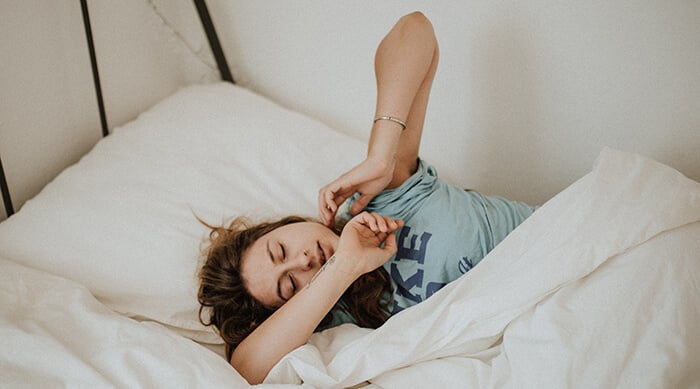Heavy or binge drinking typically leads to weight gain by making you crave unhealthy foods, slowing your metabolism, and wrecking your sleep and digestion. When you stop drinking alcohol, you’ll probably lose weight, especially when you follow other effective weight loss strategies.
Plus, quitting drinking comes with other health benefits like reducing cancer risk, lowering blood pressure, getting better sleep, and strengthening your immune system.
If you binge drink alcohol regularly, you may experience benefits of quitting drinking within just a few days. In the short-term, your stomach lining becomes less inflamed, reducing symptoms of binge drinking like acid reflux.
How long after quitting drinking do you lose weight? Once you stop drinking for 30+ days, you should see other benefits start to manifest, like weight loss.
In the United States, current Dietary Guidelines recommend that alcohol should only be consumed in moderation. That means 1 drink a day for women and up to 2 drinks per day for men. Anything beyond that can be considered drinking in excess.
Not to judge! You drink what you want. But for the purposes of this article, let’s call drinking more than the Dietary Guidelines recommend “excessive drinking.”
If you drink in excess, abstaining from alcohol is likely to help shed a few pounds and maybe a couple of inches off your waistline.
Let’s count the reasons giving up alcohol helps you lose weight.
And don’t forget — Surely’s unique, non-alcoholic rosé is here to help you on your alcohol-free journey.
Table of Contents
Reason #1: You’ll consume fewer calories.
Reason #2: You’ll sleep better.
Reason #3: You’ll consume less sugar.
Reason #4: You’ll experience fewer food cravings.
Reason #5: Your digestion will improve.
Reason #6: Your metabolism will improve.
Reason #7: You’ll be more likely to exercise
Reason #8: Your mental health will get better.
Reason #1: You’ll consume fewer calories.
Reducing calories is the most obvious way that no alcohol leads to weight loss. For most people, daily calorie intake should be around 2,000 calories to maintain a healthy weight.
Depending on the variety, the brand, and the amount of alcohol, alcoholic beverages may contain a lot of calories:
- Can of beer — 154 calories
- Glass of wine — 123 calories
- Shot of whiskey — 105 calories
- Gin & tonic — 170 calories
- Sangria — 215 calories
- Margarita — 200 calories
- Mojito — 242 calories
- Manhattan — 187 calories
- Mimosa — 160 calories
- Moscow mule — 182 calories
And whoever drinks one mimosa at brunch? Pssh. Imagine how quickly these calories add up when someone is at a bar or a party!
Alcohol is typically full of empty calories. They have no nutritional value, but still add to your calorie count.
Whereas you may see ice cream or a slice of pizza as an indulgence that you’re careful about, you may not see glasses of wine or bottles of beer the same way, even if they may contain similar calorie counts (and grams of sugar).
Ultimately, walking away from a daily drink (or more) of alcohol means you are avoiding hundreds of calories, which can quickly lead to weight loss.
Just don’t replace those calories with sugary sodas and juices. Get a water filter for your home. Only order water at restaurants. Water has zero calories. You’ll thank me later.
Reason #2: You’ll sleep better.
One of the clearest health benefits of cutting out alcohol is better sleep. Bonus: higher-quality sleep may lead to weight loss!
Although a drink in the evening can help you fall asleep at first, it reduces REM (random eye movements) sleep, which is what you really need to wake up refreshed.
Alcohol use before bed may increase alpha wave patterns, which is bad if you’re looking for high-quality, restorative sleep.
How does sleep affect weight? Sleep deprivation or low-quality sleep affects your weight by increasing stress hormones that make it more difficult to burn fat. We want to reduce stress, making it easier to burn fat.
Also, some experts hypothesize that low-quality sleep leads to hormonal changes that increase appetite. Cutting back on alcohol can improve your sleep and, therefore, decrease your appetite.
Reason #3: You’ll consume less sugar.
Many cocktails and mixers are rife with added sugar. But did you know that there is already sugar in red wine and champagne? (It’s from the grapes.) Consuming less sugar is sure to promote healthy weight loss.
Research positively correlates sugar intake and body weight. In other words, the more sugar you take in, the higher your body weight will be.
Eating too many added sugars triggers inflammation in your body. That inflammation can trigger weight gain and make it harder to lose weight.
Removing added sugars (and refined carbs) from your diet can definitely help with inflammation and weight loss. Goodbye, sugary mixed drinks. 🍹
Another sugar-related benefit of quitting alcohol is reduced insulin resistance, which may lead to weight loss.
Insulin resistance is when your cells have a harder time taking sugar from your blood to use for energy. This can lead to type 2 diabetes. 1 in 3 Americans has some form of insulin resistance.
A few years back, researchers observed 102 people taking part in Dry January. Their insulin resistance went down, which is great for losing fat.
When you’re insulin resistant, your blood sugar levels are higher and you store a lot more fat than normal. When you stop drinking, you’re less insulin resistant, and therefore store less fat. At the very least, this stops weight gain. At best, this promotes weight loss.
Reason #4: You’ll experience fewer food cravings.
Drinking makes you crave junk food. If you cut out alcohol, your cravings for unhealthy junk food should go down as you detox, leading to weight loss.
Excessive alcohol can lower blood sugar, which may lead to craving extra sugar and carbs.
Experts will tell you: When you indulge in alcohol, your ability to make smart dietary choices gets weaker and weaker. If you drink a can of beer, you’re more likely to eat a high-calorie plate of nachos.
Drinking alcohol often leads to shorter, lower quality sleep, which studies suggest result in additional calorie intake. One study observed 30 minutes of sleep deficit led to people eating 83 additional calories per day.
Research published in Appetite shows that drinking one drink seems to stimulate food cravings for high-calorie foods. So it makes sense that quitting alcohol can reduce those cravings.
As mentioned earlier, alcohol messes with your sleep quality. Low-quality sleep can actually screw up the hormones that regulate hunger, fat storage, and that feeling of fullness. Getting rid of alcohol normalizes these appetite hormones.
Reason #5: Your digestion will improve.
Your digestive system treats alcohol as a toxin, which makes sense — alcohol is a known human carcinogen and neurotoxin. Your digestive system works very hard to remove alcohol.
When you stop drinking alcohol, your digestive system has an easier time doing its other important jobs, which may contribute to weight loss.
After alcohol intake, the alcohol is burned as a fuel source before anything else. That means alcohol is used for energy before glucose from carbohydrates, leaving that glucose to be stored as fat. Giving up drinking prevents those excess fat stores.
Alcohol screws with your digestive function. It may trigger stress on the stomach and intestines, decreasing digestive secretions. This reduces how many nutrients your body breaks down and absorbs.
If you quit drinking, you can improve the metabolism of these organs (which play a large role in weight management).
Removing alcohol from your diet can also reduce your risk of developing acid reflux or stomach inflammation.
Note: Heavy binge drinking can lead to weight loss due to malnutrition, which is obviously not a healthy way to drop a few pounds. Technically, you can lose weight by drinking a ton of alcohol… but you’ll wreck the rest of your health in the process.
Reason #6: Your metabolism will improve.
When you give up alcohol, your metabolism improves. When your metabolism works more efficiently, weight loss may follow.
You may have heard something like, “Wow! You have the metabolism of an 18-year-old!” Well, alcohol definitely ages your metabolism.
One way alcohol affects our metabolism is that alcohol is burned for energy before glucose from carbs. This makes it more likely that glucose is stored as fat for later use.
Alcohol also affects testosterone levels in both men and women. This can impair your ability to burn fat. When you give up alcohol, it is easier to get rid of fat.
Low testosterone levels in men may be a sign of metabolic syndrome, which is characterized by high cholesterol and high body mass index.
Heavy drinkers and long-term drinkers experience slower metabolisms. But it’s not too late to give up alcohol, restore your metabolism, and lose excess weight.
Reason #7: You’ll be more likely to exercise
Exercise is a vital part of losing weight, but alcohol makes it harder to exercise for several reasons:
- Alcohol is a depressant. It literally slows you down. Your endurance and aerobic capacity plummet, so workouts after drinking are pretty inefficient. Exercise is more efficient when you don’t drink!
- Muscle gain is inhibited when drinking. Weight loss and muscle gain are different, yes, but it’s worth noting that quitting alcohol can promote muscle gain.
- When you are drinking, you are not exercising. That’s a little oversimplified, but if you don’t drink, you have more free time to exercise.
- Feeling hungover discourages exercise because your energy is sapped and you don’t want to aggravate your hangover. No alcohol means no hangovers, increasing the likelihood of exercising.
- A 2017 study concludes, “Heavy alcohol consumption significantly reduces sleep quality, and significantly increases daytime sleepiness the following day.” Daytime sleepiness is the enemy of motivation to exercise.
Working doesn’t have to be scary. It can even be easy! Start with walking around the neighborhood, or parking in the back of the parking lot at work or the store. Regular exercise is the cornerstone of overall wellness.
Also, exercise is an excellent way to take your mind off alcohol, especially if you’re having trouble with alcohol cravings.
Reason #8: Your mental health will get better.
While alcohol creates short-term happiness for some people (with a dopamine surge), heavy drinking contributes to worsened mental health and emotional stability. On the other hand, when you eliminate or significantly reduce your alcohol intake, you give your brain and emotions the opportunity to heal and regulate.
When you get a mental health and well-being boost, you are more likely to exercise, reduce stress levels, and go out of your way to buy healthier foods — all of which contribute to weight loss.
Alcohol is only part of the weight loss equation.
There are other evidence-based strategies that can support the weight loss that happens when you give up alcohol:
- Eat healthy foods. Avoid refined carbs, trans fat, and empty calories. Make smart food choices like whole fruits and veggies, high-quality meats, and fiber-rich seeds. Portion control is your friend.
- Drink plenty of water. 🚰 Keep up your hydration to avoid headaches that feel like next-day hangovers.
- Don’t replace alcohol with indulgent, high-calorie foods. Avoid sugary sodas and juices.
- Get 7-8 hours of high-quality sleep.
- Exercise! It’s so easy. And it’s vital. You don’t need a gym membership. You don’t need to stress about it. Think of exercise as a stress reliever.
7 Tips for Successfully Ditching Alcohol
- Replace alcoholic drinks with alcohol-free, no-sugar-added substitutes, like Surely’s alcohol-removed rosé. There are great alcohol alternatives out there, including delicious mocktails.
- Prepare yourself for activities that usually include alcohol. Instead of cracking open a beer on football night, just drink water in a Solo cup while you watch the game. Instead of mimosas at brunch, opt for sparkling water. It’s still 0 calories, but looks fancy. 💅
- Look for new activities to replace drinking. Meditation, going to the gym, and new hobbies are all great alternatives to sitting down with a drink. There are apps to connect you with other sober and sober curious people, so you can get together and help each other forget about alcohol.
- Write down a plan for your alcohol-free life. What will you do when you feel an urge to drink? Do you have anyone to call for support, and their phone numbers? What are alcohol alternatives you want to try?
- Establish a strong circle of support. Ditching the drink is easier with friends and allies on your side. You could even look into resources like AA (Alcoholics Anonymous), a registered dietitian, or a recovery coach.
- Be okay with not losing 30 pounds in a month. It’s safe and healthy to lose up to 2 pounds every week, according to various experts.
- Don’t give up. So many people give up their New Year’s resolutions within the first month. But you don’t have to!
The bottom line is that excessive alcohol intake can make you gain weight. Heavy drinking can lead to extra calories and obesity, not to mention cancer, liver disease, and other diseases.
What happens after 4 days of not drinking? After 4 days of not drinking, you should be getting better sleep. And you should be thanking yourself for avoiding hangovers. However, if you’re a very heavy drinker, you may still be experiencing withdrawal symptoms at day 4.
What happens after 30 days of not drinking? If you are interested in Dry January, Sober September, or Sober October, you’ll be glad to know what happens after 30 days of not drinking: improved overall health, higher quality sleep, better liver health, lower risk of heart disease, and probably some weight loss.
Working to drop pounds, but afraid you’ll miss out on a daily glass of wine? Surely’s got you covered — snag a bottle of our alcohol-removed, super low-sugar wines.
It’s real wine, without the alcohol.
Sources
- Alcohol Consumption and Obesity: An Update
- Alcohol and sleep I: effects on normal sleep
- The Acute Effects of Alcohol on Sleep Electroencephalogram Power Spectra in Late Adolescence
- Dietary sugars and body weight: systematic review and meta-analyses of randomised controlled trials and cohort studies
- Parallel 15: Alcohol‐induced Liver Injury: Clinical and Experimental
- Inverse relationship of food and alcohol intake to sleep measures in obesity
- Influence of moderate alcohol consumption on emotional and physical well-being
- Results From the Study of Health in Pomerania
- Alcohol Hangover, Sleep Quality, and Daytime Sleepiness




![How to Stop Drinking [Temporarily or Forever]](https://dropinblog.net/34240221/files/featured/how-to-stop-drinking.jpg)

